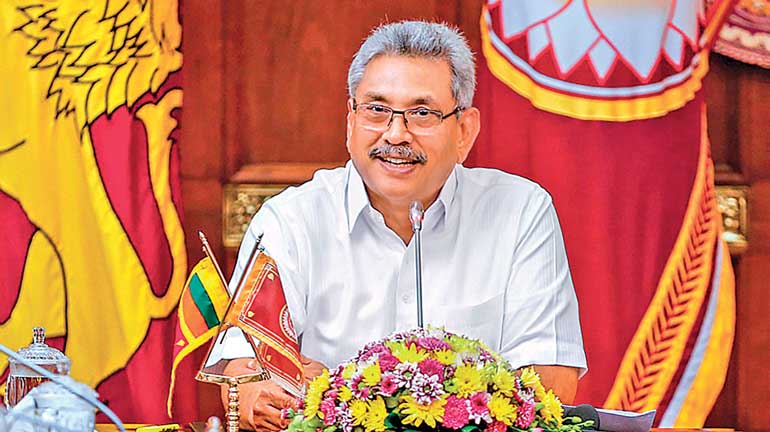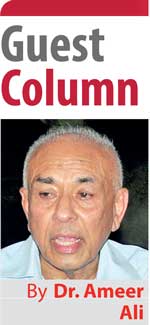Sunday Feb 15, 2026
Sunday Feb 15, 2026
Tuesday, 12 April 2022 03:56 - - {{hitsCtrl.values.hits}}

President Gotabaya Rajapaksa
Nationwide public demonstrations continue. The strategic long holiday declaration for New Year celebrations with the intention of dampening protestors’ tenacity is not going to work, because there is hardly anything to celebrate with shortage of victuals, valueless rupee, long queues for essentials and frequent power cuts. To the protestors’ credit demonstrations so far had remained largely peaceful although their patience has limits, and more importantly, they are devoid of any ethnic or religious exclusivity.
A sinister attempt to colour the protests with a Muslim extremist brush had failed in Mirihana. This is of historic significance in the context of Sri Lanka’s seven decades old ethno-nationalism. It is pleasing to see fasting Muslim women openly participating in and addressing public rallies. The entire community should join this national protest. The one slogan that reverberates in all demonstrations is, “Gota Go Home”.
The Government, having lost its two-third majority already, and facing the possibility of losing even a working majority, is in a hopeless position to put together a more capable cabinet of ministers than the ones resigned, and ended up in reshuffling the portfolios once again. In short, for the first time in the history of this country, there is a dysfunctional government.
To make matters worse, a monomaniac president is digging his heels in and refuses to stand down, while his legislators in Parliament are shamefully backing him. Like street thugs they are even challenging the Opposition for a fight. One Government member childishly challenged the leaders of two Opposition parties to take up the finance portfolio for six months and prove their expertise. With such parliamentarians what could one expect from this rubble of a government? Why then GR is refusing to go? Obviously, he seems to be relying on the support of two strategic pillars, the military and monastery.
Of the two, whether the military with six armoured regiments would be ready to confront the unarmed but determined masses and unleash acts of terror upon them is doubtful. An incident that was reported from Kurunegala a couple of days ago referring to a young demonstrator who was able to convince an armed security officer and moved him to tears, when he reasoned out to the officer why he and his colleagues were protesting, reveals an important and fundamental truth. After all, even military men and police officers are humans with families and relatives, many of whom face the same misery and agony as the protestors do.
When tens of thousands of such unarmed civilians flood the streets would security forces obey orders and massacre them? It is unlikely, because these demonstrators are neither insurrectionists nor separatists, but innocent victims of a corrupt political system that had deprived them of a decent living. They are agitating for a new Sri Lanka, free of corruption, nepotism, injustice, discrimination and inequities – evils that had ruined this nation for over 70 years. In addition, there is also the psychology of large numbers. It is easier to bomb from the sky and kill hundreds of thousands than to face that same number face to face on ground and fire directly at them.
A second incident tells that the monastery also may turn against the regime if demonstrations continue unabated. This was when a Buddhist monk wanted to join the demonstrators at Battaramulla. He was politely and respectfully requested to keep away, because protestors wanted their struggle to remain secular. This is a healthy sign which should convince the Sangha that the current generation of youngsters do not want religious elements to hijack its epochal mission. No wonder that the usual suspects like the Gnanasaras and Rathana Theras were conspicuous by their absence from the battleground. In sum, the two strategic pillars on which GR hoping to rely for support look wobbly.
There is no denying the fact that the immediate issue confronting the nation is the economy. The damage done to it on multiple fronts especially over the last two years would take more than the IMF initiated remedies to repair. The Speaker of Parliament’s desperate plea to members in the Opposition to suggest remedial measures to put the economy in order is pointless under the prevailing political set up. In the meantime, the newly appointed Governor of CBSL, Dr. Nandalal Weerasinghe (NW), is on a thankless mission but seems to be on the right track.
He has already reversed the monetary policies of his two predecessors. His decision to raise interest rates by 75 basis points is historic but absolutely essential. And more importantly, he has promised to restore the independence of CSBL which, under his predecessors was virtually mortgaged to the whims and fancies of a President who had no clue as to how an economy should be managed. NW is also calling for new fiscal measures to increase public revenue without cutting expenditure on welfare. This demands an interim budget.
Yet, in spite of NM’s monetary measures and expected IMF assistance it would take more than macroeconomic stability to revive the economy and create a growth momentum. NW underscored this difficulty when he said that political crisis and social unrest must end to ensure greater stability. This is imperative, but cannot happen unless the current President and the corrupt Government are removed in whatever order. Otherwise, there would be obstacles to the efforts of reformers and some of the reforms could be sabotaged by vested interests that stand to gain from status quo.
Moreover, the $ 3 billion immediate injection into Government coffers which the new Finance Minister is calling for has to come partly from IMF and partly from capital surplus friendly countries such as those from the Middle East. In actual fact, the country needs more than that amount to overcome its immediate needs, and it has to come in a mixed bag of outright grants and below market rate long term loans. But with controversial human rights records and bungled foreign policies whether the ethno-religious majoritarian GR regime would be able to invoke Arab generosity, despite a Muslim Finance Minister, is highly unlikely.
Thus, the era of economic and social reforms should start on a new political plane. The removal of GR and abolition of the executive presidency are sine qua non, because they have become a colossal liability for domestic peace, economic revival and international support. Until that happens peaceful demonstrations and public protests would and should continue. The Opposition, including the Tamil and Muslim parties, should not in the meantime work to betray the demonstrators by compromising with GR and negotiating for an interim government in which a few of them could become ministers. What the country needs today is a fundamental and systemic change to overhaul its democratic structure that had been emptied of its substance over 74 long years.
(The writer is attached to the School of Business and Governance, Murdoch University Western Australia.)